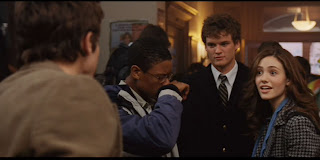
Today's Out Spotlight became the first openly gay California legislator in 1994. In 1997, she was the
first woman in California to be named Speaker pro Tempore. She was also a
member of the nation’s first legislative LGBT Caucus. In 2002, she
coauthored a bill that defined marriage as a civil contract between two
persons, which passed the state legislature, but was vetoed by the
governor. She is also was a part of one of the iconic shows in the golden age of television. An actor, activist and academic today's Out Spotlight is Sheila Kuehl.

The daughter of a Catholic airplane construction worker and his Jewish
wife, Kuehl grew up in Los Angeles and glided through school. A natural
ham, she landed her first paid acting role at age 8 on a radio series.
"I learned about professional behavior, showing up on time, knowing your
lines, not stepping on someone else's laughs."

As a young actress with the stage name Sheila James, she played Jackie, Stuart Erwin's tomboy daughter, in the television show
Trouble With Father, which was later retitled
The Stu Erwin Show. But she is best known for her portrayal of the "irrepressible" Zelda Gilroy in the long-running 1960s TV show
The Many Loves of Dobie Gillis.
The running gag was Zelda's roaring crush on Dobie, and his resistance
to her advances. The program spawned two sequels, an unsold television pilot,
Whatever Happened to Dobie Gillis? (1978) and TV movie
Bring Me the Head of Dobie Gillis
(1988). In these, Dobie had married Zelda and had a son named Georgie,
who was like Dobie had been at his age. Kuehl reprised her Zelda role in
both updates.

Although her character Zelda was popular
enough for CBS to plan a spin-off, the pilot was canceled. A network
representative later explained she was “just a little too butch.” During
the same time, she was banned from her sorority house when letters
from her girlfriend exposed her sexuality.
She co-starred in the short-lived television series
Broadside, a female version of the hit show
McHale's Navy during the 1964-65 season. After the show's cancellation, television roles started to dry up,
she transitioned into academia getting a job as a campus adviser to student groups at UCLA and eventually became an associate dean of students.
At age 34, she was admitted into Harvard Law School,
where she excelled being elected class marshal and president of law
school student council. In 1978, her final year at the law school, she
chaired the celebration of the 25th anniversary of the 1953 graduation
of the first group of women to be admitted to Harvard Law School. That
same academic year, she became the first woman to win "Best Oralist" in
the law school's prestigious Ames Moot Court Competition, judged by a panel including Supreme Court Justice Thurgood Marshall.
Kuehl went into private law practice
specializing in civil rights and women’s issues. She advocated for
victims of domestic abuse and cofounded the California Women’s Law
Center in 1989. She taught law at UCLA, University of Southern
California and Loyola University.

Elected to the California State Assembly in 1994, she become the first openly gay person elected to the California legislature. She was later a founding member of the California Legislative LGBT Caucus. She served as Speaker pro tempore
during the 1997–98 legislative session, becoming the first woman in
California history to hold the position. After three terms in the
Assembly, she was elected to the California State Senate in 2000, beating Assemblyman Wally Knox in the Democratic primary and becoming the first openly gay person elected to the Senate.
Re-elected in 2004 with 65.7% of the vote, she has repeatedly been voted the "smartest" member of the California Legislature.
In 2002, she
coauthored a bill that defined marriage as a civil contract between two
persons, which passed the state legislature, but was vetoed by the
governor.

In 2004, Senator Kuehl authored Senate Bill 1234, an omnibus act
intended to protect Californians from hate crimes, which it defined as
criminal acts committed in whole or in part because of the victims'
actual or perceived disability, gender, nationality, race or ethnicity,
religion, sexual orientation, or association with persons with any of
those characteristics. Her bill targeted crimes, not First
Amendment-protected speech. It also protected illegal immigrants from
deportation due to reporting hate crimes, increased civil protections
from discrimination, and provided for law enforcement training
concerning crimes against homeless persons and law enforcement response
to homelessness. Governor Schwarzenegger signed the bill into law.
In 2006, she sponsored a bill that would prohibit the adoption by any
school district in California of any instructional material that
discriminates against persons based on their gender or sexual
orientation.

Throughout her career as a legislator, Kuehl took a leadership role on health care policy. Her foremost objective was securing passage of legislation to establish a single-payer health care system in California.
SB 840 passed both houses of the legislature in 2006, but was vetoed by Governor Arnold Schwarzenegger; it was reintroduced in 2007 and again passed the state Senate, with a vote pending in the Assembly.
SB 840 passed both houses of the California legislature in August 2008 and was, again, vetoed by Governor Schwarzenegger.
By the end of her political career in 2008 she had authored over 171 bills that had been signed
into law.

Kuehl is the recipient of the John F.
Kennedy Profiles In Courage Award (2003); the C50 Award, Celebrating 50
years of Women at the Harvard Law School (2003); the Outstanding
Legislator Award from the Southern California Public Health Association
(2003); the Victory Fund Leadership Award (2005); the Building a State
of Equality Award from Equality California (2006); and the UCLA LGBT
Center Distinguished Service Award (2007).
“The
hardest thing I ever did, coming out, turns out to give me a reputation
almost instantly for honesty and courage, which any politician would
kill for.”
And for the naysayers of twitpics.... here you go.



















































